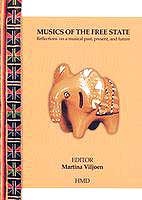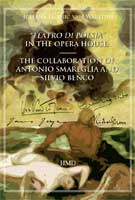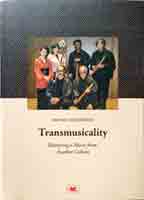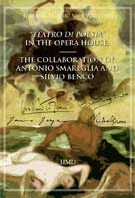Arhiva kategorije: Muzikologija bez granica
Muzikologija bez granica / Musicologie sans frontières
Muzikologija bez granica
Serija ‘Muzikologija bez granica / Musicologie sans frontières’, koja se objavljuje na engleskom jeziku, zamišljena je kao serija koja omogućuje da međunarodno zanimljive muzikološke teme budu lako dostupne domaćim i inozemnim stručnim i znanstvenim krugovima.
Musicologie sans frontières
The series is published in English, and its title indicates that the CMS is offering a possibility for any world musicologist to publish his/her monograph or proceedings in Croatia.
Popis serije:
- Juliana Ličinić van Walstijn: „Teatro di poesia“ in the Opera House: The Collaboration of Antonio Smareglia and Silvio Benco, 2009.
- Martina Viljoen (ed.): Musics of the Free State: Reflections on a musical Past, Present, and Future, 2015.
- Bruno Deschênes: Transmusicality. Mastering a Music from Another Culture, 2022.
Musics of the Free State
Musics of the Free State: Reflections on a musical Past, Present, and Future
Editor: Martina Viljoen
Muzikologija bez granica, br. 2
Hrvatsko muzikološko društvo / Croatian Musicological Society, 2015.
362 str.
 Bilješka o knjizi
Bilješka o knjizi
The book Musics of the Free State is an imposing volume: nine substantial and far-reaching essays (preceded by an introduction) offer the reader a plural, occasionally disturbing and intellectually invigorating analysis of Bloemfontein and its environs through the prism of the Odeion School of Music (OSM). The (comparatively) recent formation of the OSM clearly serves as the animus and motivating impulse of the entire book. Indeed, most of the contributors are intimately associated with the OSM and serve on its faculty, so that the School itself acts as a nexus or fulcrum for the deliberations on music as an agent of political, cultural and social engagement in South Africa which animate the volume from beginning to end. In this respect the book affirms a coherence which, despite the (valuable) plurality of its contents, invites a readership from across the entire musicological community.
Musics of the Free State doubtless makes its most intimate appeal to South Africa itself, but the essays are so profoundly indentured to international modes of scholarship (notably North American, British and European traditions) that it is difficult to escape the compelling relevance which the volume as a whole maintains in relation to global musical practice, especially in three domains: ethnomusicology, education and socio-cultural discourse. Such domains do not exhaust this volume’s reach (there are important contributions on infrastructure and the analysis of art music which easily transcend their local context), but the book’s engagement with musical practices in post-Apartheid South Africa in general (and the Free State in particular) speak over and again to postcolonial and indeed postmodern problems which resonate far beyond sub-Saharan Africa. This is a volume which is truly international in its address.
Contents:
Dale Cockrell: Elephants, communities, and 1994: An introduction
Johan Moll: On the history of Bloemfontein and significant cultural institutions and manifestations
Nicol Viljoen: The Free State Orchestral Training Programme: A model Infrastructure for music education in the Free State and South Africa
Elene Cloete: Entanglement in an “off the map” city: An ethnographic journey through the city of Bloemfontein, South Africa
Gregory Barz: Reinscribing coloured cultural identity through music: South African jazz musicians as cultural historians in the Heidedal township of Bloemfontein, Free State
Frelét de Villiers: Photography as music reportage: Musical life at the Odeion School of Music
Martina Viljoen and Bonisile Gcisa: The documentation and arrangement of indigenous song in the Free State regions of South Africa: Constructing places of the heart, the home, the land, of wisdom, and the sacred
Matildie Thom Wium: The place of Africa in Stefans Grové’s The Soul Bird Trio (1998)
Martina Viljoen: Music in the Vulture Club: How ‘free’ is the Free State?
Marius Coetzee: Towards the future: A strategic re-positioning of the Odeion School of Music, University of the Free State
2015.
ISBN 978-953-6090-57-0
180,00 kn
„Teatro di poesia“ in the Opera House
Juliana Ličinić van Walstijn
„Teatro di poesia“ in the Opera House: The Collaboration of Antonio Smareglia and Silvio Benco
Muzikologija bez granica, br. 1
Hrvatsko muzikološko društvo / Croatian Musicological Society, 2009.
376 str.

Bilješka o knjizi
„Teatro di poesia“ in the Opera House: The Collaboration of Antonio Smareglia and Silvio Benco
Smareglia!? Who was he? The undeserved oblivion fallen on Antonio Smareglia (1854-1929) has, for a long time, confined this composer to being a typical subject for academic research and learned studies with little or no consequence on the actual revival of his music in opera houses or concert halls. Yet, his works bear the imprint of a strong personality, his style being an intriguing blend of three musical traditions: Italian, German and Slav.
A contemporary of Puccini, Smareglia was occasionally associated with Verismo on account of his Nozze Istriane (1895) to a libretto by Illica, but his artistic sensibility was alien to that genre no less than to Puccinian-like subjects. Ultimately, Smareglia’s most distinctive operas – La Falena, Oceana, Abisso – are rather akin to symbolist and decadent music theatre as they display fantastic plots, atmospheric settings and large symphonic movements. Of the three operas, Oceana can perhaps best exemplify the nature of Smareglia’s inspiration as an artist born by the sea (the Istrian coast of the Adriatic) writing about the sea. Successfully premiered at La Scala under Toscanini in 1903, the opera has a haunting sirens’ chorus and pervasive sea music which sets the pace of the action in an unbroken spell of dreamlike visions.
This study of the three operas results from the earnest commitment and genuine passion of Juliana Ličinić van Walstijn, herself a native of Pola (Istria) like Smareglia. She explores the cultural background in which the composer grew up and worked, and focuses on his fruitful collaboration with the Triestine novelist and critic Silvio Benco which led to the creation of a teatro di poesia with a strong emphasis on the musical components over the dramatic development of the action. In this study, the cultural climate of European Symbolism and Decadence is clearly related to the genesis of Smareglia and Benco’s allusive and purely musical works, and references to D’Annunzio’s art or Arnold Böcklin’s sea paintings foster a full appreciation of the operas. Adequate space (the first three chapters) is given to a wealth of informative material on Smareglia and Benco. La Falena, Oceana and Abisso are then examined and discussed in great detail both in terms of musical analysis and with regard to the libretto and sources of each opera.
Juliana Ličinić van Walstijn argues convincingly in favour of Smareglia’s originality and sustains her views with exhaustive musical examples and excerpts from the critical literature on the reception of that music. Her work proves an illuminating and useful reading.
Indeed, this book points to a further target that is unfortunately beyond the author’s personal reach. It makes a strong claim for the revival of Smareglia’s operas and it can only be hoped that Oceana or any other of his works may soon be put to the test in an opera house and prove their worth.
(Matteo Sansone)
***
“Teatro di poesia” u operi: suradnja Antonija Smareglie i Silvia Benca
Ovo djelo pokušava pokazati mjesto Antonia Smareglie u talijanskoj operi na prijelazu iz 19. u 20. stoljeće uz pomoć istraživanja posljednjih triju Smarglijinih opera. Ispitivanje neobičnih tema i jedinstvene atmosfere opera Falena, Oceana i Abisso pokazuje njihovu izvanrednu originalnost i sugerira da pripadaju „poetskom teatru“ stvorenom skladatelja u suradnji sa Silviom Bencom.
Ova studija istražuje kulturnu pozadinu u kojoj je Smareglia djelovao. S obzirom da su i Smareglia i Benco većim dijelom pali u međuvremenu u zaborav, i jedva da ih se spominje u povijesti opere, prva tri poglavlja služe da uvedu dva umjetnika i odrede opseg materijala kojim se bavi ova studija. Glavno žarište knjige pružaju tri opere. Istraživanje njihovih osebujnih i inovativnih zapleta pokazuje da je Smareglijinu muzikalnost stimulirao književni ukus njegova libretista. Nadalje, na usporedbi s djelom njegova bolje poznatoga suvremenika Giacoma Puccinija pokazuje se kako se u svojoj reakciji na Bencove „nedramatičke“ priče i ozračja Smareglia odmaknuo od ukusa i mode u talijanskoj operi svojega doba. Stil Bencovih libreta i Smareglijina glazbenog idioma pokazuje kako su oba umjetnika dala prednost glazbenim aspektima pred dramatskim, s jasnom odlučnošću da stvore novi stil u operi. Prožeti klimom simbolizma i dekadentnosti bili su na najboljem putu da stvore ono što se naziva „teatro di poesia“ („kazalište pjesništva).
Istraživanje nastoji pokazati koliko je vrijedan Smareglijin doprinos opernom repertoaru. Njegove opere Falena, Oceana i Abisso originalnije su i maštovitije od većine opera napisanih od strane njegovih talijanskih suvremenika.
Bilješka o autoru
Juliana Ličinić van Walstijn graduated in Musicology, Music Publishing and Music Education at the University of Zagreb Music Academy. Since then she has been involved in administering piano competitions, organising and participating at conferences, employed in library work and academic teaching. Her many years of research of Italian opera at turn of the 19th and 20th centuries, in particular of the composer Antonio Smareglia, led her to write a doctoral thesis. She was awarded a PhD in Music at the University of Edinburgh in 2002, having worked with David Kimbell and Raymond Monelle as her mentors.
Julijana’s interests continue to involve musicology, music teaching and arts administration. Recently she has taken her enthusiasm for this composer and his work to a number of other European cities, including Belfast, where she works at Queen’s University Belfast, Centre for Excellence in the Creative and Performing Arts: An Interdisciplinary Arts Programme.
2009.
ISBN 978-953-6090-33-4
150,00 kn + poštarina
US$ 36.00 / Euro 25.00 + postage


